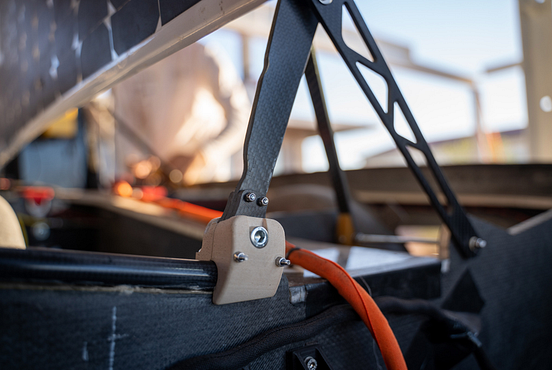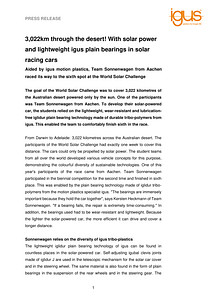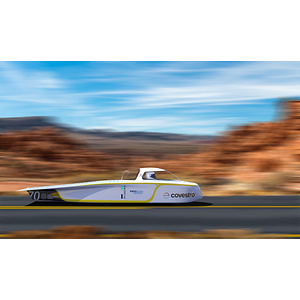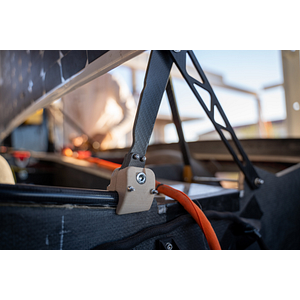3,022km through the desert! With solar power and lightweight igus plain bearings in solar racing cars
Published on: 23rd October 2019
Aided by igus motion plastics, Team Sonnenwagen from Aachen raced its way to the sixth spot at the World Solar Challenge

The goal of the World Solar Challenge was to cover 3,022 kilometres of the Australian desert powered only by the sun. One of the participants was Team Sonnenwagen from Aachen. To develop their solar-powered car, the students relied on the lightweight, wear-resistant and lubrication-free iglidur plain bearing technology made of durable tribo-polymers from igus. This enabled the team to comfortably finish sixth in the race.
From Darwin to Adelaide: 3,022 kilometres across the Australian desert. The participants of the World Solar Challenge had exactly one week to cover this distance. The cars could only be propelled by solar power. The student teams from all over the world developed various vehicle concepts for this purpose, demonstrating the colourful diversity of sustainable technologies. One of this year’s participants of the race came from Aachen. Team Sonnenwagen participated in the biennial competition for the second time and finished in sixth place. This was enabled by the plain bearing technology made of iglidur tribo-polymers from the motion plastics specialist igus. “The bearings are immensely important because they hold the car together”, says Kersten Heckmann of Team Sonnenwagen. “If a bearing fails, the repair is extremely time-consuming.” In addition, the bearings used had to be wear-resistant and lightweight. Because the lighter the solar-powered car, the more efficient it can drive and cover a longer distance.
Sonnenwagen relies on the diversity of igus tribo-plastics
The lightweight iglidur plain bearing technology of igus can be found in countless places in the solar-powered car. Self-adjusting igubal clevis joints made of iglidur J are used in the telescopic mechanism for the solar car cover and in the steering wheel. The same material is also found in the form of plain bearings in the suspension of the rear wheels and in the steering gear. The wear-resistant and lubrication-free endurance runner has a very low coefficient of friction on a variety of shaft materials, especially in dry operation and is vibration-dampening. An advantage especially for the steering. In the hinges of the cover lock there are also plain bearings made of the material iglidur G. The tribo-polymer is cost-effective and has a high wear resistance.
Special solution printed quickly
The cover of the solar car posed a special challenge to the team. The driver must be able to open and close the car independently when entering and exiting, which was one of the rules of the Challenge. A difficult task, because the cover is 5 metres long, hardly one metre in width and weighs 25kg with the solar cells. So far, the opening was jerky and needed a lot of force. The problem lay in the heavy, printed bearings made of standard polymer. The team gave an urgent order to igus for 3D printed bearings made from high-performance polymer iglidur I3. The laser sintering material is characterised by its low coefficient of friction and, like all iglidur materials, is resistant to dust and dirt and is ideally suited for the desert. Thanks to the use of the printed bearing, the driver now only needs a few seconds to get in and out.
The young engineers support from igus promotes innovative projects
Projects such as Sonnenwagen from Aachen are supported by igus as part of the “young engineers support” (yes) programme. With the university initiative, igus wants to support pupils, students and lecturers with free samples, sponsorships and the development of innovative projects. For more information about the university support, visit www.igus.eu/yes.




